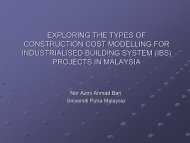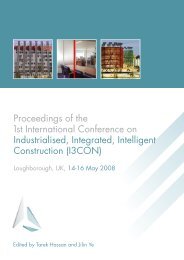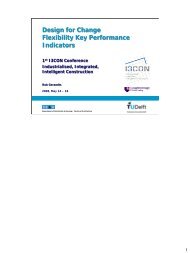Industrialised, Integrated, Intelligent sustainable Construction - I3con
Industrialised, Integrated, Intelligent sustainable Construction - I3con
Industrialised, Integrated, Intelligent sustainable Construction - I3con
You also want an ePaper? Increase the reach of your titles
YUMPU automatically turns print PDFs into web optimized ePapers that Google loves.
SUSTAINABLE CONSTRUCTION HANDBOOK 2<br />
120<br />
Acknowledgements<br />
The research described in this paper is carried out as a PhD research project by Bas Hasselaar under<br />
daily supervision of Regina Bokel. The simulation model used in this paper was made by Wim van<br />
der Spoel, the tests were carried out at the climate chamber of Cauberg Huygen Raadgevend<br />
Ingenieurs (CHRI) in Zwolle.<br />
References<br />
1. Linden, A.C. van den, Boerstra, A.C., Raue, A.K., Kurvers, S.R., De Dear, R.J.: Adaptive temperature<br />
limits: A new guideline in The Netherlands a new approach for the assessment of building performance<br />
with respect to thermal indoor climate. Energy and Buildings, vol. 38, (2006) 8-17<br />
2. Hasselaar, B.L.H., Spoel, W.H. van der, Bokel, R.M.J., Cauberg, J.J.M.: Simulation of the thermal<br />
performance of a Climate Adaptive Skin. CISBAT conference proceedings (2007) 55-60<br />
3. Nieuwenhout, F.D.J.: ECN on-line yearly yield simulator. ECN Yearly yield CGI Interface version 2.40<br />
(2008) www.ecn.nl/solar/yield<br />
Author’s Biography<br />
Bas Hasselaar, MSc (1979) studied Building Technology at the Faculty of<br />
Architecture at Delft University of Technology, The Netherlands. In 2002 he<br />
interrupted his study in Delft to study the Masters course ‘Sustainable<br />
Development’ at the Faculty of the Built Environment at the University of New<br />
South Wales in Sydney, Australia at which he graduated with High Distinction.<br />
In 2003, he returned to the Delft University of Technology to graduate with<br />
Honourable Mention. In 2004-2005 he conducted research into the possibilities<br />
of decentralised sanitation in an urban context, after which he started his PhD<br />
research into Climate Adaptive Skins.<br />
Johannes J.M. Cauberg (1944) studied Building Physics at the faculty of<br />
Applied Sciences at Delft University of Technology (The Netherlands). From<br />
1968 till 1975 he worked as a consultant at Huygen Consulting Engineers. In<br />
1975 he became CEO of this firm changing its name into Cauberg-Huygen<br />
Consulting Engineers BV, a consultancy in the fields of building physics,<br />
climate and environmental engineering. In 1999 he was inaugurated as full<br />
professor in Building Physics and Building Services at Delft University of<br />
Technology. Since 2009 he is an emeritus professor.<br />
Regina Bokel is researcher and university lecturer in building physics & climate<br />
design with focus on energy modelling and ventilation in the built environment.<br />
Wim van der Spoel is researcher and university lecturer in building physics &<br />
climate design with focus on passive cooling, low-energy and dynamical<br />
systems modelling of energy processes in the built environment.






